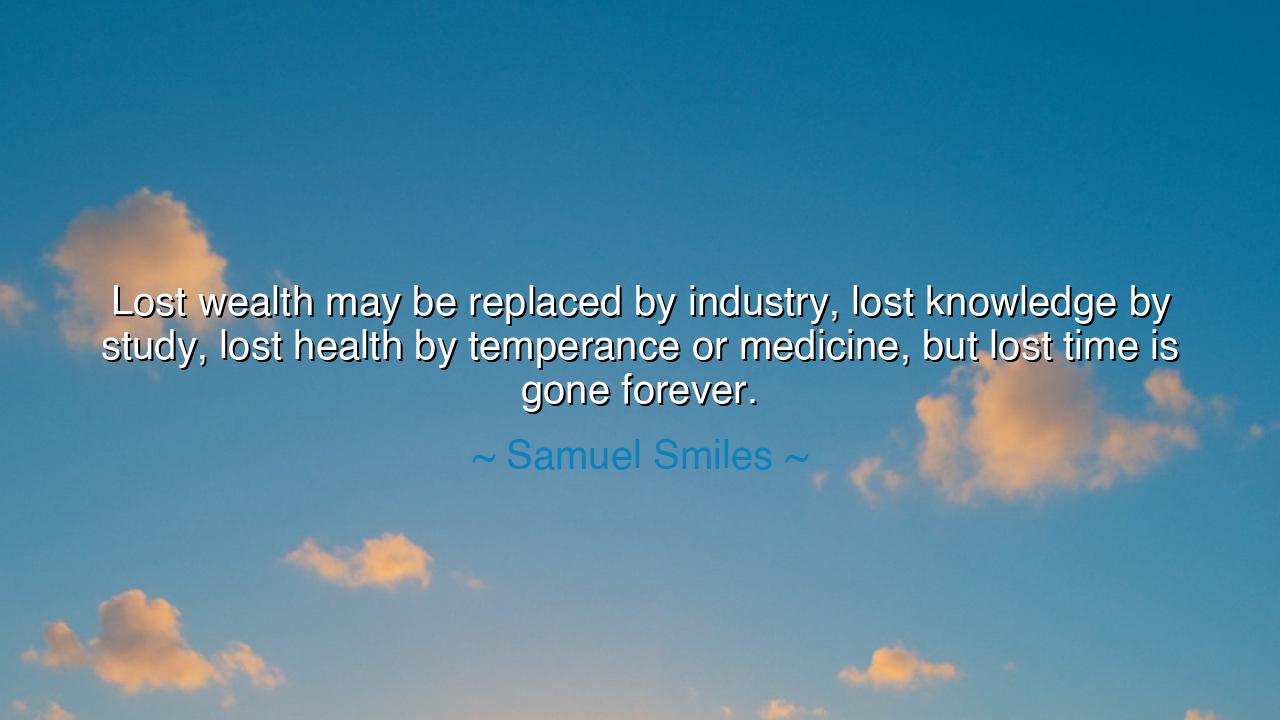
Lost wealth may be replaced by industry, lost knowledge by study
Lost wealth may be replaced by industry, lost knowledge by study, lost health by temperance or medicine, but lost time is gone forever.






Hear the words of Samuel Smiles, the wise chronicler of diligence and self-help, who declared: “Lost wealth may be replaced by industry, lost knowledge by study, lost health by temperance or medicine, but lost time is gone forever.” In these few words lies the solemn rhythm of truth—the heartbeat of all human striving. For though gold may glitter again, and strength may return to weary limbs, the river of time flows only in one direction, and no mortal hand can turn it back. It is the most precious of all treasures, and yet the most carelessly spent.
Smiles lived in an age of rising machines and restless ambition, when men measured worth by their labor and their gain. Yet even amid the thundering of progress, he heard the quieter call of eternity—the reminder that time is the one wealth that neither coin nor craft can restore. His words are not merely a warning, but a hymn to the sacredness of the moment. For wealth, knowledge, and health are servants of the will; they may be regained by patience and effort. But time—once it has passed the threshold of the present—becomes a ghost that no prayer can recall.
Think of the great Alexander the Great, conqueror of worlds. When death approached him in Babylon, he is said to have wept, not for the loss of his empire, but for the loss of time—the fleeting hours that no crown could purchase. He had conquered nations but could not conquer the clock. In his final days, he ordered his physicians to carry him to his tomb, his empty hands displayed for all to see, so that the world might know: even kings go to the grave with nothing but the moments they have lived. Thus, the mightiest among men confessed the truth that Samuel Smiles spoke centuries later—time is the one possession no power can reclaim.
To the industrious man, wealth lost is no despair, for his hands and mind can build again. To the student, knowledge forgotten is not death, for the lamp of learning may be relit by effort and humility. To the sick, even failing strength can find renewal through discipline and temperance, or the healing mercy of medicine. But time, once idly cast away, lies buried beyond the reach of remedy. Every wasted hour is a seed that never grew, a song that was never sung, a chance that will never return. The ancients likened it to water spilled upon the ground—impossible to gather again.
Yet this truth need not bring sorrow, but awakening. For though lost time cannot return, the present moment stands ever before us—new, unsullied, full of promise. The wise do not mourn what is gone; they sanctify what remains. Every sunrise is an unearned gift, a fresh page upon which destiny may be written anew. The fool measures his life in years; the sage measures it in purpose. He who honors his hours with discipline and meaning will find that even a short life may shine brighter than centuries of idleness.
Reflect, then, on the example of Benjamin Franklin, who, as a youth, carved upon his mind the motto: “Dost thou love life? Then do not squander time, for that is the stuff life is made of.” By that creed he rose from poverty to greatness, not by haste, but by order—by the sacred economy of minutes. He understood that every idle moment robbed the future of its harvest. And so he filled his days with labor, invention, and service, leaving behind not only wealth but wisdom, proving that time rightly used is the seed of immortality.
Let this, then, be the lesson passed from the wise to the willing: Guard your time as you would your soul. Rise early, not merely from sleep but from indifference. Speak less idle words, dream fewer empty dreams, and do each task with reverence, for it consumes a fragment of eternity. Seek not to fill your days, but to fulfill them. Remember always: the hour you waste today is a portion of your life you shall never live again.
And so, children of tomorrow, heed the call of Samuel Smiles. Let no moment drift unmarked, no opportunity pass unseen. For industry may restore wealth, study may recover wisdom, temperance may renew health—but lost time is gone forever. Therefore, live as though every hour were sacred, every breath a prayer, and every sunrise a summons to purpose. Then, when the sands of your life at last fall silent, you may say not, “I have lost time,” but, “I have lived it well.”






AAdministratorAdministrator
Welcome, honored guests. Please leave a comment, we will respond soon